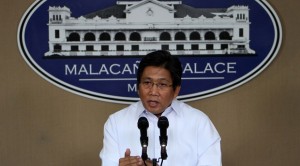MANILA, Philippines–The government is exhausting all efforts to assist and protect the rights of the 88 other Filipinos languishing on death row in China and other countries, and “make sure they would get justice,” Malacañang said on Wednesday.
Communications Secretary Herminio Coloma Jr. said the Department of Foreign Affairs (DFA) and other agencies were “doing everything necessary to protect the rights of Filipinos accused or convicted of various crimes abroad.”
Coloma, also head of the Presidential Communications Operations Office (PCOO), said the Aquino administration was also “strengthening awareness among overseas Filipino workers and other Philippine nationals abroad on the laws of their host countries.”
This was necessary to prevent the violation of such laws, he said.
He said the government was also providing support to the families here of the death-row prisoners abroad.
According to the DFA, there are 88 Filipinos on death row abroad, about half of whom were convicted of drug-related offenses.
Senators Cynthia Villar and Nancy Binay last Tuesday called for intensified government assistance to OFWs and other Filipinos on death row long before their execution notices.
Filipinos who are on trial abroad, regardless of guilt or innocence, deserve the assistance of the state, Villar said.
“As early as now, we should be exhausting all efforts for the commutation of death sentences to lower penalties for other Filipinos in foreign jails,” she said.
The OFWs on death row should “have access to competent legal assistance so that they can sufficiently defend their cases in foreign courts,” Villar said.
“Let us not let Filipinos who toil in other countries to sustain their families be placed in threatening situations,” she added.
Binay cited the alleged shortfalls in the Indonesian trial of drug convict Mary Jane Veloso, like the lack of a competent translator, as a valid reason to increase the government’s legal aid fund for distressed OFWs.
“The [fund] is used to pay for the fees for foreign lawyers, as well as bail bonds, court fees and other litigation expenses,” she noted.
Binay said an increase in the legal aid fund was approved during the Senate deliberations on the 2015 budget, but it was subjected to “conditional implementation” in a veto message by President Aquino.
